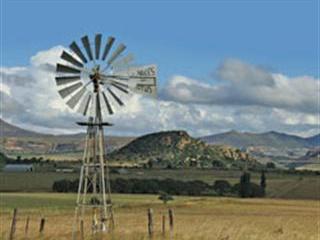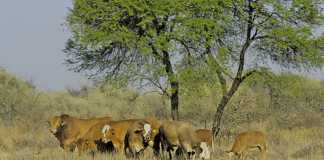
What was the single biggest mistake made by the South African commercial farming sector after 1994?
South Africa and its people are doing well despite its poor government, but without a stable agricultural sector the country will fail. The single biggest mistake the commercial farming industry made after 1994 was to react to government and ANC propaganda instead of being pre-emptive and taking the initiative.
Organised agriculture should have started a comprehensive land audit long ago and presented it to the country and government when it was clear the state wasn’t getting it together − too many people still believe white farmers own some 90% of the land. The industry should have proposed its own clear, comprehensive land reform plan long ago and publicised it widely. And it should have found innovative, creative and aggressive ways of marketing itself as the good guys to the people of South Africa.
And the biggest mistake on government’s side in terms of white commercial farmers?
The reluctance to engage with organised agriculture in a sincere effort to make progress with land reform. Instead it engaged in attacks and innuendo, feeding the negative perceptions many ordinary black people have of white farmers. For many farmers, this inspired insecurity and fear, and thus a reluctance to invest in and grow their operations.
What, in your opinion, are the current government’s perceptions about commercial farmers’ role in South African society?
This is not entirely clear. There are enough clever and sober people in government who realise that commercial farmers play a vital role in terms of food security, stability and employment. And yet government leaders sit back when sections of their own constituency (such as the Communist Party, the Youth League and some trade unions) continue to demonise farmers and use the emotive issue of land as a tool to whip up emotions.
Many wildewragtags, as you call them, have been making wild populist statements on nationalisation of white-owned land. Is South African agriculture going to follow the Zimbabwean route?
No. Our Constitution stands like a beacon of stability and security and guarantees that no land would be taken without fair compensation. The Constitutional Court has proved its independence repeatedly, and the ANC will never again get two-thirds of the members of parliament, so it won’t be able to change the Constitution.
But there could be the occasional land grab or invasion in some parts of our country and there could even be reluctance from government’s side to take action. Landowners would have to go to court and force government’s hand. Our democracy is safe because of our Constitution. It is one of the best in Africa, even in the southern hemisphere. This means nobody can change it, despite the current irresponsible political rhetoric.
You’ve said farmers should familiarise themselves with the inner workings of the ruling party. Why, and how?
They should read all newspapers and other sources of information on politics and the ANC, and invite commentators and insiders to give them a view of the dynamics of black politics and the party. If farmers don’t understand how ANC politics work and who plays what role, they won’t know who’s just a loudmouth populist who can be ignored and who’s a voice of authority. Understanding the ANC will help farmers interpret what’s said on land and agriculture and what it could mean for the future, and avoid unnecessary panic.
What’s your opinion on the land reform process so far, and how should it be managed in future?
There have indeed been several landowners who tried to make a fortune when the state wanted to buy their land. They don’t deserve to have the principle of willing-buyer, willing-seller applied. But this is overshadowed by the gross incompetence of land affairs officials in acquiring appropriate land and the absence of a clear vision on who should get land, where it should be and how new owners should be helped to become commercially viable.
Government and ANC leaders perpetuate the myths around land and the absurd insistence that all black people who want land should get it, even if just for a weekend retreat. There are hundreds, if not thousands, of experienced farm workers who see themselves as agriculturalists first, and need to be helped to establish themselves on farms. Farmers should help identify these people. Land should not go to the (politically connected) urban elite with little interest in producing food, as happened so often in Zimbabwe.
How should the commercial farming sector contribute to land reform?
The land audits under way will help everyone concerned to see the big picture. Farmers and their unions should keep contributing to this so those tasked with land reform would always know what land is available where. Farmers should help identify workers with the potential to become commercial farmers – and find pieces of land for them if the state can’t.
Farmers would advance their own cause and standing in society tremendously if they go beyond the call of duty and help new farmers get land and farm it successfully. South African agriculture is critically important for the SADC region and even the rest of Africa, in terms not only of food security, but also employment, stability and as a source of knowledge and skills.
What are the requirements of a successful agriculture minister?
To properly understand land and agriculture and the ability to connect and communicate with farmers and organised agriculture. That person must be a strong enough leader to whip departmental bureaucrats into shape and politically brave enough to counter reckless populist demands for land from hotheads in the Tripartite Alliance.
Do you have anybody in mind?
I don’t see anyone senior in the ANC with all these attributes – perhaps some sanity will return to the party after its leadership conference in Mangaung in December.
What are the best and worst case scenarios for South African agriculture’s future?
The best scenario (apart from good rain and commodity prices) would be if government could appreciate the new pragmatism among commercial farmers and form a pact with them to grow the industry. And if we could quickly establish a substantial number of new, successful black farmers with all the back-up they need. Worst case is if the present distrust of, and propaganda war against, the farming community continues and commercial farmers become more and more insecure and reluctant to invest in their land.
Email Max du Preez at [email protected] .













